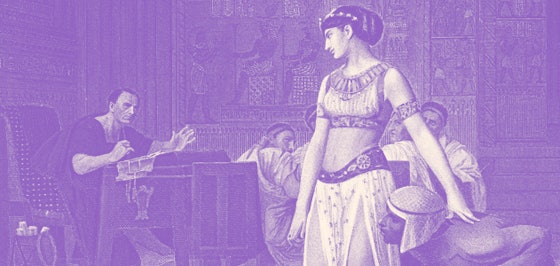Wikimystery
Why is Cleopatra constantly trending on Wikipedia?

Granger Collection, New York
Wikipedia traffic, which is documented daily, delivers a somewhat-distorted reflection of the world — the dreadful and the divine, the marvelous and the mundane.
You won’t be surprised that the traffic for “Rebecca Black” picks up on Fridays, or that the traffic for Jesus consistently increases on Easter and Christmas. “Leap year” traffic spikes at the end of February (expected) but was also popular during January and February of 2020, presumably because that year had its own leap day — and it’s no shock that when a public figure dies, their Wikipedia article explodes in popularity. The online encyclopedia, ever scrupulous, even has a page dedicated to historical traffic jump. Kobe Bryant’s page, for example, increased by nearly 100,000 percent on the day he died and “Twerking” shot up after the 2013 MTV Music Video Awards.
While some spikes are obvious, not all Wikipedia traffic patterns have an intuitive explanation. For instance, the article for Cleopatra has been exploding in page views starting in the fall of 2020 — and nobody knew why. The views fluctuate a little, but for the most part, Cleopatra has been parked in the top 10 most-viewed articles on English Wikipedia for the past year and a half. It’s been happening on Spanish Wikipedia too — in the week leading up to the 2020 election, Cleopatra got more views than Joe Biden. Last week, Cleopatra was the fourth most-viewed on English Wikipedia, behind Anna Sorokin, Ukraine, and Vladimir Putin.
She was a supremely well-tutored ruler and a lavish lover, and her life was brought to the big screen in a 1963 movie that was the most expensive film ever made at the time. Cleopatra is not irrelevant, but is she really popular enough to drive such massive hoards of traffic to her 15,000-word encyclopedic entry?
Wikipedia editors didn’t think so. Discussions percolated on the Cleopatra article’s talk page, where editors discuss the article at hand, with titles like “Trending article throughout 2021” and “WHY IS THIS STILL TRENDING?!?!” Editors were mystified by the numbers, which were “over the top” and “definitely not natural” according to a Wikipedia editor who goes by the username Triggerhippie4.
Some stumped Wikipedians surmised that there could have been a recent historical discovery, a new TV show, or manipulation from bots, but no theory completely captured the issue. “Why on Earth would anyone bother to boost this article's views with bots? I just don't see any reason why someone would bother to do that, even for a high-profile monarch from ancient history,” wrote user PericlesofAthens. But then Wikipedia editor Castlebuilder11 chimed in with an explanation that seemed to solve the mystery.
On Android phones, one of Google Assistant’s suggested searches says “Try saying “Show Cleopatra on Wikipedia.”
Aha! — The 150,000 daily views probably aren’t all coming from people interested in reading about the tempestuous tale of a long-dead Ptolemic queen but rather people testing out Google Assistant or in the case of at least one person, hitting their phone on their leg.
This isn’t the first time a seemingly-random traffic spike left Wikipedians scratching their heads. Just over a year ago, there was an even bigger traffic spike for a beautiful but unremarkable photo of a flower— not because the Michaelmas daisy was in the news, but because an app in India was driving most of the 90 million daily views (a whopping 20 percent of the total requests on all of Wikipedia Commons).
So rest assured: Cleopatra hasn’t had problematic hieroglyphics resurface (although she could perhaps be canceled for other things). Instead, she just happens to be a default Android search. Count this mildly interesting mystery solved.